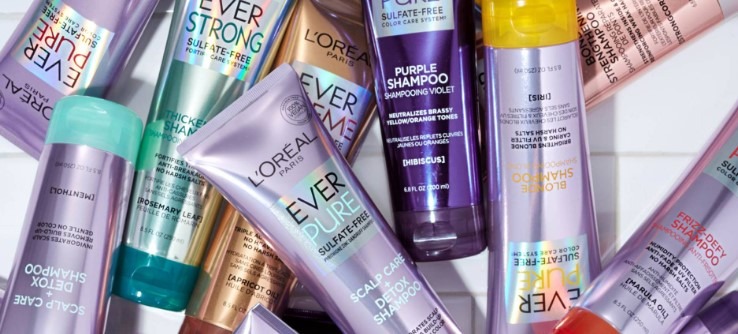Oily hair is a common problem that affects many people. It happens when the scalp makes too much sebum, which is a natural oil that helps keep the hair moist and strong. Even though sebum is important for healthy hair, too much of it can make hair look greasy and limp. Oily hair can be hard to take care of because it gets dirty quickly and needs to be washed often. Also, overwashing with harsh shampoos can make the problem worse because it strips the hair of its natural oils, which makes it make even more oil.
Fortunately, sulfate-free shampoo can be a game-changer for those struggling with oily hair. Sulfate-free shampoo is designed to gently cleanse hair and scalp without stripping away natural oils. By using a sulfate-free shampoo, it’s possible to achieve a clean, healthy scalp without overstimulating oil production. In this blog post, we’ll talk about the benefits of using sulfate-free shampoo on oily hair and give you tips on how to do it.
What are sulfates and why are they used in shampoo?
Sulfates are a type of detergent that is commonly used in shampoos and other personal care products. Their primary function is to create a lather that helps to remove dirt and oil from the hair and scalp. While sulfates are effective at cleansing, they can also have negative effects on hair and scalp health.
One of the main issues with sulfates is that they can be harsh and dry, stripping away natural oils from the hair and scalp. This can lead to the overproduction of sebum as the scalp tries to compensate for the loss of moisture, resulting in oily hair. Additionally, sulfates can be irritating to the scalp, leading to inflammation and flakiness. For people with oily hair, this can further exacerbate the problem by causing the scalp to produce even more oil.
How do sulfates contribute to oily hair?
Sulfates can contribute to oily hair in several ways. As mentioned above, they can strip away natural oils from the scalp, leading to the overproduction of sebum. When the scalp is stripped of its natural oils, it can become dry and irritated, prompting the sebaceous glands to produce more oil to compensate. This can create a vicious cycle of oil production and overwashing that can be difficult to break. Long, continuous usage can lead to hair damage and hair fall, which then requires hair loss treatment methods.
In addition to stripping away natural oils, sulfates can also be irritating to the scalp. This irritation can lead to inflammation, which can further stimulate oil production. For people with sensitive or reactive skin, this can be a significant issue that exacerbates oily hair.
Benefits of using sulfate-free shampoo for oily hair
One of the primary benefits of using sulfate-free shampoo for oily hair is that it can gently cleanse the hair and scalp without stripping away natural oils. This can help maintain a healthy balance in oil production, reducing the need for frequent washing. Additionally, sulfate-free shampoo can be less irritating to the scalp, which can help reduce inflammation and further oil production.
Sulfate-free shampoo can also be a good choice for people with colored or chemically treated hair, as it is less likely to strip away color or cause damage. Additionally, sulfate-free shampoo is often formulated with natural ingredients that can help soothe and nourish the hair and scalp, promoting overall hair health.
In short, if you’re looking for a shampoo for damaged hair, you should pick a sulfate-free shampoo.
Key ingredients to look for in a sulfate-free shampoo for oily hair
When choosing a sulfate-free shampoo for oily hair, it’s important to look for ingredients that can help reduce oil production and soothe the scalp.
- Tea tree oil, for example, is a natural antifungal and antimicrobial agent that can help eliminate excess oil and prevent dandruff.
- Witch hazel is another ingredient that can be helpful for oily hair, as it has astringent properties that can help reduce oil production.
- Essential oils for hair growth can be beneficial for oily hair, as they can help stimulate blood flow to the scalp and reduce inflammation.
When choosing a sulfate-free shampoo, it’s important to consider individual hair and scalp needs. For example, people with very oily hair may benefit from a stronger formula with higher levels of active ingredients, while those with more sensitive scalps may prefer a gentler formula. It’s also important to look for shampoos that are free from potentially irritating ingredients such as fragrances and artificial colors.
Tips for using sulfate-free shampoo for oily hair
To get the best results from sulfate-free shampoo for oily hair, it’s important to use it correctly. This may involve adjusting washing frequency and techniques to achieve optimal results. Here are some tips for using sulfate-free shampoo for oily hair:
- Wet hair thoroughly before applying shampoo.
- Use a small amount of shampoo and massage it into the scalp and hair, focusing on the roots.
- Rinse hair thoroughly with warm water.
- If needed, repeat the process to ensure all oil and buildup are removed.
- Follow up with a lightweight, sulfate-free conditioner, focusing on the mid-lengths and ends of the hair.
- Rinse hair thoroughly with cool water to help close the cuticle and seal it in moisture.
- Consider reducing washing frequency to once or twice a week, depending on individual needs.
Conclusion
Sulfate-free shampoo can be a powerful tool if you are looking for how to get rid of oily hair. By gently cleansing the hair and scalp without stripping natural oils, sulfate-free shampoo can help to maintain a healthy balance of oil production and reduce irritation and inflammation on the scalp. When combined with other lifestyle changes, such as reducing stress and avoiding heavy styling products, sulfate-free shampoo can be part of a comprehensive approach to managing oily hair.
If you’re struggling with oily hair, we encourage you to give sulfate-free shampoo a try. Look for formulas that are designed specifically for oily hair and contain ingredients such as tea tree oil, witch hazel, and peppermint. Remember to adjust your washing frequency and techniques to suit your individual needs, and incorporate other lifestyle changes for the best results. With a little patience and perseverance, you can achieve healthy, balanced hair that looks and feels its best, since hair is so important for humans.




